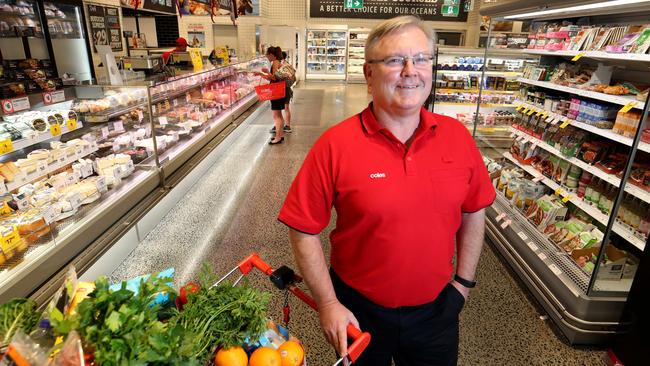How Coles stepped up to help feed the nation
BCA’s Biggies Awards finalist: During the pandemic Coles donated extra food and groceries to food banks to help Australians facing hardship.

The Business Council of Australia’s Biggies Awards finalist: Coles
-
Australia produces more food than it consumes but when the pandemic hit communities last year, many Australians became focused on stockpiling groceries to see them through the lockdowns. It was a time when our big supermarkets came under pressure to ensure supplies of essentials and to make sure that shoppers — especially older or vulnerable shoppers — had safe access to stores.
For Coles, the coronavirus was a time to step up, CEO Steven Cain says. “Since the COVID pandemic began, Coles has proudly embraced our role as an essential service to the community, guided by our purpose to sustainably feed all Australians and help them lead healthier and happier lives. Throughout every challenge, our values of working with passion, pace and responsibility to the community were at the heart of our decision making.”
From mid-March last year, Coles began donating extra food and groceries to food banks to the retail value of $1m a week to help Australians who were facing hardship as a result of the coronavirus. Food relief organisations in turn distributed the food to up to 3800 community food programs across Australia.
For Redkite, a charity for families facing childhood cancer, Coles’ Online Priority Service allowed people with fragile immune systems to still receive food.
“When COVID-19 hit, it put Australia’s most vulnerable into immediate isolation,” says Tatiana Isaacs, general manager of fundraising at Redkite. “It was Coles’ Online Priority Service that immediately came to the rescue. Families facing childhood cancer received instant access to online priority shopping and contactless delivery so they could get the supplies they needed and keep their immuno-compromised child safe.”
The not-for-profit food distributor, Second Bite, also saw benefits from Coles’ generosity, and was able to support extra essential food donations to their centres.
“Coles immediately came to the support of SecondBite providing essential food donations from its distribution centres, building on the surplus produce we collect from about 800 supermarket nationwide,” SecondBite CEO Jim Mullan says. “This support enabled us to keep up with the increasing number of people in need.”
As well as direct donations, Coles also reacted quickly to ensure food supplies were distributed fairly across its stores, and it introduced a “community hour” so shoppers who needed special assistance were given priority.
That initiative was launched at the end of March to provide vulnerable and elderly members of the community with a safer shopping experience and improved access to stores to purchase groceries. It was later extended to healthcare and emergency services workers on Tuesdays and Thursdays.
Last Easter, when Australians were still struggling with the challenges of the pandemic, Coles decided the essential workers so crucial in the crisis needed a treat. Social distancing rules were still restricting celebrations, so Coles donated more than 8000 packets of Easter eggs to medical staff at hospitals across Australia as a small gesture of thanks for their service. The treats were hand-delivered to hospitals including Monash Children’s Hospital, Sydney Children’s Hospital and Brisbane’s Prince Charles Hospital.
In July, when the public housing towers in inner Melbourne were placed in mandatory lockdown, Coles was on the frontline to help. It temporarily closed and repurposed a supermarket in Waterfield Street, Coburg, as a pop-up fulfilment centre specifically for the towers’ residents.
It was an emergency, and the company’s staff packed 1000 boxes with donations of fresh foods including fresh meat, dairy and bread for residents who had been shut in with little warning.
Each of the boxes was packed with enough to feed four people for three days, and included forms for residents to request specific supplies during the quarantine period.
General manager corporate affairs, Sally Fielke, says that Coles was on the frontline well before COVID-19 struck and the company continues its commitment to serving the community in times of need. Immediately before COVID, Coles was working to support and feed the community through drought, the bushfires of 2019-20 and then flooding on the east coast. After a year of waves of panic buying that stretched the company’s supply chains, natural disasters are once again front of mind with flooding in NSW, Queensland and WA last month.
“Our teams are ready to be deployed in times of crisis,” she says. “Their role is to ensure that stores get supplies and that we do whatever is needed to ensure customers are able to access food and other products. We also need to make sure our own team members are working safely in these situations. We’re very well practised in co-ordinating that sort of disaster response, but with the pandemic it was both longer in duration and more widespread.
“Ordinarily we’ll reallocate resources from unaffected areas so that we can get stores in the disaster zone up to speed as quickly as possible, but that doesn’t work when every store in the country is hit with panic-buying at once.
“To get back on track we made major changes to the way we do business — things like operating hours, online delivery services, commissioning temporary warehouse facilities, working with suppliers to consolidate our product range and focus on the essentials. Before the pandemic these things would take months if not years to achieve, and we turned them around in days. We’ve always been ready to do whatever we think is needed because we know that our stores are at the heart of our communities, but now we have a new perspective on what is possible — literally nothing is off the table.”
She says the pandemic changed views: “For some people, Coles has a reputation as a big brand and there is a sense it was not really connected to their lives or community.
“I think 2020 made them feel the company is embedded in their local areas and ready to help. It’s also given our teams a real sense of pride. We all had to rally and rely on each other and it has made people feel proud of their work. What’s really come together in the last year is that we have developed crisis teams and processes where it’s all hands on deck.”







